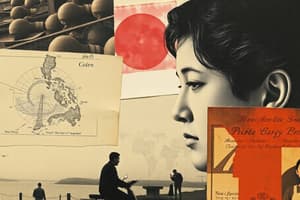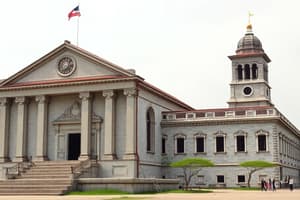Podcast
Questions and Answers
What is the main focus of Araling Panlipunan?
What is the main focus of Araling Panlipunan?
- Natural sciences and biology
- Mathematics and statistics
- Social studies encompassing various disciplines (correct)
- Physical education and sports
Which of the following is NOT a key component of Araling Panlipunan?
Which of the following is NOT a key component of Araling Panlipunan?
- Culture
- Economics
- Geography
- Physics (correct)
What is one goal of Araling Panlipunan?
What is one goal of Araling Panlipunan?
- Learning foreign languages
- Enhancing physical fitness
- Improving technological skills
- Developing critical thinking and analytical skills (correct)
Which teaching method is emphasized in Araling Panlipunan?
Which teaching method is emphasized in Araling Panlipunan?
What type of assessment is used in Araling Panlipunan?
What type of assessment is used in Araling Panlipunan?
Flashcards are hidden until you start studying
Study Notes
Araling Panlipunan
-
Definition: Araling Panlipunan is the Filipino subject focusing on social studies, encompassing history, geography, economics, sociology, and political science.
-
Goals:
- Develop critical thinking and analytical skills.
- Foster understanding of social realities and civic responsibilities.
- Promote appreciation of culture and history.
-
Key Components:
- History: Study of past events, important figures, and national heroes in Philippine history.
- Geography: Understanding the physical features, climate, resources, and environmental issues of the Philippines and the world.
- Economics: Basics of economic principles, resources allocation, and the economic system in the Philippines.
- Politics: Exploration of government systems, political ideologies, and rights and duties of citizens.
- Culture: Study of Filipino traditions, arts, beliefs, and practices.
-
Curriculum Structure:
- Organized around grade levels from elementary to high school.
- Activities include research projects, presentations, and debates.
-
Current Issues: Examination of contemporary social issues such as poverty, education, health care, and environmental sustainability.
-
Teaching Methods:
- Use of multimedia resources, field trips, and interactive activities to engage students.
- Encouragement of discussions and critical perspective on social issues.
-
Assessment:
- Combination of quizzes, projects, essays, and class participation to evaluate understanding and engagement.
-
Importance:
- Empowers students to be informed and active citizens.
- Equips learners with knowledge necessary for personal and societal development.
Araling Panlipunan: The Study of Society
- Araling Panlipunan is the Filipino subject for social studies.
- It incorporates elements of history, geography, economics, sociology, and political science.
- The main objective is to foster critical thinking, analytical skills, and civic responsibility in students.
- Key components include:
- History: Exploration of the Philippines' past events, significant figures, and national heroes.
- Geography: Understanding the Philippines' and the world's physical features, climate, resources, and environmental issues.
- Economics: Learning about basic economic principles, resource allocation, and the Philippine economic system.
- Politics: Exploring government systems, political ideologies, and citizens' rights and duties.
- Culture: Studying Filipino traditions, arts, beliefs, and practices.
- The curriculum is structured across different grade levels, from elementary to high school.
- Teaching methods involve diverse activities like research projects, presentations, debates, and multimedia resources.
- Current societal issues like poverty, education, healthcare, and environmental sustainability are examined.
- Assessment encompasses quizzes, projects, essays, and active class participation, allowing evaluation of understanding and engagement.
- Araling Panlipunan empowers students to become informed and active citizens, equipping them with knowledge for personal and societal growth.
Studying That Suits You
Use AI to generate personalized quizzes and flashcards to suit your learning preferences.




